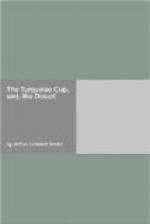“It is Ali,” said Abdullah, “and Nicha’s maid is with him. They have caught us up.”
He ran out and found the camels kneeling and Ali easing the surcingles.
“Ali,” he cried, “you must change your religion.”
“Willingly,” said Ali; “what shall the new one be? The old one has done little for me.”
“Christian,” said Abdullah.
“That suits me,” said Ali; “under it one may drink wine, and one may curse. It is a useful religion for a trader.”
“And the maid?” asked Abdullah.
“We have travelled a day and a part of a night together,” said Ali, “and she will believe what I tell her to believe.”
“The old religion is good in some respects,” said Abdullah. “Call the maid;” and they went to the hut.
“Here are the witnesses,” said Abdullah, “ready to be Christians.”
“It is not necessary,” said the priest, “if they can make their mark; that is all that is required.”
So, in the little hut, before an improvised altar, they were married—the camel-driver and the daughter of the Chief of Ouled Nail.
The next morning the caravan took up the march for Biskra.
THE MOTHER OF THE ALMEES
It was the great fast of Rhamadan, and the square of Biskra was crowded with white-robed men waiting for the sun to set that they might eat.
The rough pavement was dotted with fires over which simmered pots filled with what only a very jealous God indeed would have called food. About them were huddled the traders from the bazaars, the camel-drivers from the desert, the water-carriers from Bab el Derb. Each man held a cigarette in his left hand and a match in his right. He would smoke before he ate.
In the long arcades the camels, in from the Soudan, knelt, fasting. An Arab led a tame lion into the square and the beast held back on his chain as he passed the flesh-pots, for he, too, was fasting. Crowds of little children stood about the circle of the fires, fasting. A God was being placated by the sufferings of His creatures.
There is little twilight in the latitude of Biskra. There is the hard, white light of the daytime, five minutes of lavender and running shadows, and then the purple blackness of the night.
The mueddin took his place on the minaret of the mosque. His shadow ran to the centre of the square and stopped. He cried his admonition, each white-robed figure bowed to the earth in supplication, a cannon-shot at the citadel split the hot air, and in an instant the square was dotted with sparks. Each worshipper had struck his match. The fast was over until sunrise.
The silence became a Babel. All fell to eating and to talking. A marabout, graceful as a Greek statue, came out of the mosque and made his way among the fires. As he passed, the squatting Mussulmans caught at his robe and kissed it. Mirza, the mother of the Almee girls, her golden necklaces glinting in the firelight, came walking by. As she passed the marabout he drew back and held his white burnoose across his face. She bent her knee and then went on, but as she passed she laughed and whispered, “Which trade pays best, yours or mine?” and she shook her necklaces.




